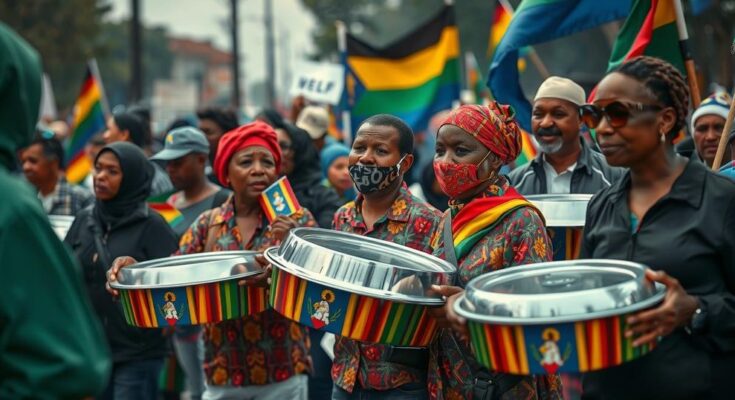In Mozambique, extensive protests erupt in response to disputed election results, led by opposition leader Venancio Mondlane. Citizens engage in nocturnal pot-banging protests, known as “panelaco,” amid severe police repression and significant economic upheaval. The unrest has resulted in fatalities and heightened tensions, echoing deep-seated frustrations against the ruling government and its policies, fostering a critical moment in Mozambique’s civil society.
In Maputo, the capital city of Mozambique, residents are actively protesting the results of the October 9 elections, which declared Daniel Chapo of the ruling Front for the Liberation of Mozambique (Frelimo) the winner. Opposition leader Venancio Mondlane rejected these results, claiming widespread electoral fraud, leading to protests manifesting in a unique form of cacophony: nightly pot-banging sessions known as “panelaco.” These protests, although peaceful, have been met with severe police action, resulting in a significant loss of life and civil liberties. Reportedly, over 30 fatalities have been recorded amidst confrontations between protesters and security forces. As calls for nationwide shutdowns echo throughout the nation, public dissatisfaction burgeons due to the government’s handling of the election and broader economic struggles, signalling a critical moment for Mozambique’s civil society. Amid calls for protests, citizens have taken to the streets despite facing threats from law enforcement agencies. The unrest has negatively impacted local economies, especially along vital trade routes with South Africa, leading to food shortages and significant economic losses. This situation has prompted regional bodies to take action, signalling the urgency of addressing the unfolding crisis. Activists have rallied behind Mondlane’s leadership, indicating a broad commitment to push back against perceived injustices and systemic oppression. The severity of this response has raised concerns about a potential return to violence reminiscent of Mozambique’s historical conflicts. Researchers suggest that the protests represent a collective frustration that transcends electoral grievances, reflecting a desire for systemic change amidst enduring socioeconomic difficulties. The evolving situation remains tense as citizens express their discontent through creative yet resilient forms of protest, highlighting an unprecedented level of civic engagement and a potential shift in Mozambique’s historical trajectory regarding civil rights and democracy.
The protests in Mozambique arise from widespread discontent following the October 9 elections, where the ruling party announced an overwhelming victory amid accusations of fraud. This political turmoil is exacerbated by Mozambique’s longstanding economic stagnation, characterized by a decade of minimal growth and high disenchantment with the ruling elite. The overarching grievances represent not merely reactions to political events but are steeped in deeper socioeconomic frustrations experienced by the populace.
The ongoing protests in Mozambique reflect a pronounced shift in public sentiment, illustrating the convergence of political and socio-economic grievances. As citizens engage in innovative forms of protest against government actions perceived as oppressive, there is an increasing urgency for dialogue and resolution. The tragic loss of life and economic instability underscore the necessity for swift intervention by regional entities while highlighting the resilience of citizen engagement amidst adversity.
Original Source: www.aljazeera.com




